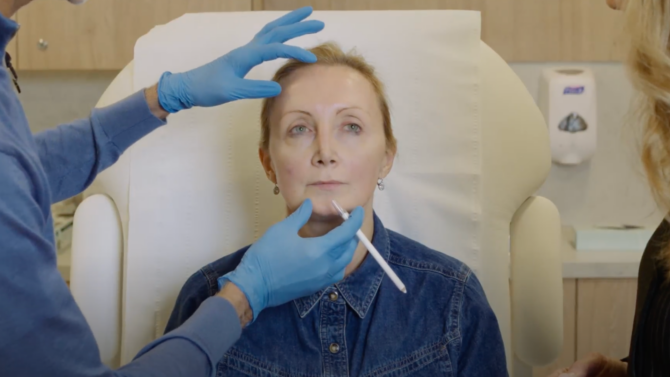HIFU stands for high-intensity focused ultrasound, a treatment that can target various tissue depths in the skin for tightening, lifting and contouring. It can be used on both the face and body.
What does HIFU do?
Like most energy-based treatments, HIFU is aiming to cause a bit of controlled damage to the collagen in your skin. To do this, HIFU narrows its sound-energy waves to a single point. These don’t hit the surface of the skin, as a laser would, but a predetermined spot up to 4.5mm beneath the skin’s surface. What each jolt of ultrasound is aiming to do is strike deep into the skin in order to make the collagen contract, and to stimulate the formation of new collagen and elastin over the next few months, which further tightens up the skin.
It can do this at different depths (1.5mm, 3mm and 4.5mm) below the surface for greater tightening. At 4.5mm below the skin’s surface, the ultrasound can reach the superficial muscular aponeurotic system (SMAS). The SMAS is a layer of muscular tissue in the face that surgeons manipulate when they are performing a face lift.
Is Ultherapy the same as HIFU?
As with all energy-based tweakments, there are slightly different types of HIFU on offer, some of which are branded. Any of them can be called HIFU as this is a type of treatment rather than a brand, in the way that not all vacuum cleaners are Hoovers. So if two different clinics offer ‘HIFU’, it may not be the same treatment at each. The best known branded HIFU devices are Ultracel (which combines HIFU with radio frequency and microneedling, if needed) and Ultherapy, which is the only ultrasound-based treatment device to have achieved FDA clearance for its stated claim of lifting the skin.
Does HIFU hurt?
HIFU is often touted as a ‘lunchtime face lift’ as it’s a quick procedure with minimal visible side effects, but there might be some redness and swelling afterwards, so you may not want to return to work straight away. Sometimes some light bruising can occur the next day, but downtime is overall minimal. Having said that, being totally honest – most people do find HIFU pretty uncomfortable or even painful. Many practitioners will advise patients to take painkillers beforehand or offer a topical anaesthetic. However, this discomfort only occurs during the treatment and is short lived.
Does HIFU work?
Every patient and their concerns and anatomy are different, but in short – yes, HIFU ‘works’. It’s a good option for those with moderately aged, sagging skin and/or jowls who want overall skin tightening and rejuvenation, so the face looks lifted and smoother overall. As HIFU is a one-off treatment and the results can last around 18 months, it may be a good first foray into tweakments if you’re not quite sure if injectables are for you or you don’t want to do something with a course of treatments.
How much does HIFU cost?
While the cost of all tweakments depends on the clinic’s location, practitioner experience and skill level and many more factors, you can reasonably expect to pay upwards of £1,000 for a HIFU treatment.
How does HIFU work on the body?
For the body, HIFU can be used to target the fat layer and destroy fat cells, so it’s ideal for body contouring post-pregnancy or for use on tummy fat, bingo wings, thighs and under the buttocks. Practitioners and patients like it as it’s effective for both inch loss and fat loss while also tightening the skin at the same time.
Use our practitioner finder to find a brilliant practitioner near you who provides HIFU treatments.
Related Stories

Concerns
The Tweakment Ladder: How To Take Your First Steps In Tweaks
Given the huge number of tweakments available, it’s increasingly hard to work out where you should...

Tweakments
Less Is More – How To ‘Press Pause’ On Ageing With Natural-Looking Filler
Can we really ‘press pause on ageing’ using dermal filler? Alice visited globally-renowned...

Tweakments
Three Free Tweaks
After my recent story about The £1000 face, I thought I’d better tone it down a bit and write...

Concerns
The Best Body Treatments That Go Beyond Fat Loss
Rightly or wrongly, when it comes to our bodies and especially body tweakments, we tend to focus on losing...







 The Tweakments Chatbot
The Tweakments Chatbot